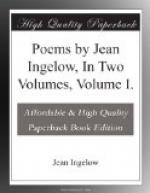In sooth, a lyre! and as the soft air played,
Those branches stirred, but did not disunite.
“O emblem meet for me!” the Poet said;
“Ay, I accept and own thee for my
right;
The shadowy lyre across my feet is laid,
Distinct though frail, and clear with
crimson light,
Fast is it twined to bear the windy strain,
And, supple, it will bend and rise again.
“This lyre is cast across the dusty way,
The common path that common men pursue,
I crave like blessing for my shadowy lay,
Life’s trodden paths with beauty
to renew,
And cheer the eve of many a toil-stained day.
Light it, old sun, wet it, thou common
dew,
That ’neath men’s feet its image still
may be
While yet it waves above them, living lyre, like thee!”
But even as the Poet spoke, behold
He lifted up his face toward the sky;
The ruddy sun dipt under the gray wold,
His shadowy lyre was gone; and, passing
by,
The woodman lifting up his shears, was bold
Their temper on those branches twain to
try,
And all their loveliness and leafage sweet
Fell in the pathway, at the Poet’s feet.
“Ah! my fair emblem that I chose,” quoth
he,
“That for myself I coveted but now,
Too soon, methinks, them hast been false to me;
The lyre from pathway fades, the light
from brow.”
Then straightway turned he from it hastily,
As dream that waking sense will disallow;
And while the highway heavenward paled apace,
He went on westward to his dwelling-place.
He went on steadily, while far and fast
The summer darkness dropped upon the world,
A gentle air among the cloudlets passed
And fanned away their crimson; then it
curled
The yellow poppies in the field, and cast
A dimness on the grasses, for it furled
Their daisies, and swept out the purple stain
That eve had left upon the pastoral plain.
He reached his city. Lo! the darkened street
Where he abode was full of gazing crowds;
He heard the muffled tread of many feet;
A multitude stood gazing at the clouds.
“What mark ye there,” said he, “and
wherefore meet?
Only a passing mist the heaven o’ershrouds;
It breaks, it parts, it drifts like scattered spars—
What lies behind it but the nightly stars?”
Then did the gazing crowd to him aver
They sought a lamp in heaven whose light
was hid:
For that in sooth an old Astronomer
Down from his roof had rushed into their
mid,
Frighted, and fain with others to confer,
That he had cried, “O sirs!”—and
upward bid
Them gaze—“O sirs, a light is quenched
afar;
Look up, my masters, we have lost a star!”
The people pointed, and the Poet’s eyes
Flew upward, where a gleaming sisterhood
Swam in the dewy heaven. The very skies
Were mutable; for all-amazed he stood
To see that truly not in any wise
He could behold them as of old, nor could
His eyes receive the whole whereof he wot,
But when he told them over, one WAS NOT.




